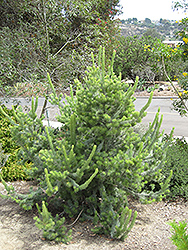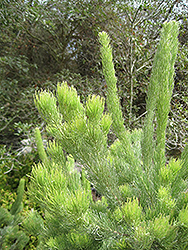It's all about ...
plants

Height: 20 feet
Spread: 12 feet
Sunlight:
![]()
![]()
Hardiness Zone: 9a
Other Names: syn. Hakea suaveolens
Description:
An unusual and attractive shrub to small tree; stiff, conifer-like leaves have pointed tips; small, fragrant white flowers appear in fall and winter; a great informal screen, coastal windbreak, or barrier plant; vigorous and adaptable
Ornamental Features
Sweet Hakea is primarily valued in the landscape for its ornamental upright and spreading habit of growth. It has attractive bluish-green evergreen foliage which emerges chartreuse in spring. The spiny needles are highly ornamental and remain bluish-green throughout the winter.
Landscape Attributes
Sweet Hakea is a multi-stemmed evergreen shrub with an upright spreading habit of growth. Its relatively fine texture sets it apart from other landscape plants with less refined foliage.
This is a relatively low maintenance shrub, and should only be pruned after flowering to avoid removing any of the current season's flowers. It is a good choice for attracting birds and bees to your yard, but is not particularly attractive to deer who tend to leave it alone in favor of tastier treats. It has no significant negative characteristics.
Sweet Hakea is recommended for the following landscape applications;
- Accent
- Mass Planting
- Hedges/Screening
- General Garden Use
- Windbreaks and Shelterbelts
- Container Planting
Planting & Growing
Sweet Hakea will grow to be about 20 feet tall at maturity, with a spread of 12 feet. It has a low canopy with a typical clearance of 1 foot from the ground, and is suitable for planting under power lines. It grows at a medium rate, and under ideal conditions can be expected to live for 60 years or more.
This shrub does best in full sun to partial shade. It prefers to grow in average to dry locations, and dislikes excessive moisture. It is not particular as to soil pH, but grows best in sandy soils, and is able to handle environmental salt. It is highly tolerant of urban pollution and will even thrive in inner city environments. This species is not originally from North America.
Sweet Hakea makes a fine choice for the outdoor landscape, but it is also well-suited for use in outdoor pots and containers. Its large size and upright habit of growth lend it for use as a solitary accent, or in a composition surrounded by smaller plants around the base and those that spill over the edges. It is even sizeable enough that it can be grown alone in a suitable container. Note that when grown in a container, it may not perform exactly as indicated on the tag - this is to be expected. Also note that when growing plants in outdoor containers and baskets, they may require more frequent waterings than they would in the yard or garden. Be aware that in our climate, most plants cannot be expected to survive the winter if left in containers outdoors, and this plant is no exception. Contact our experts for more information on how to protect it over the winter months.
This plant is not reliably hardy in our region, and certain restrictions may apply; contact the store for more information.

